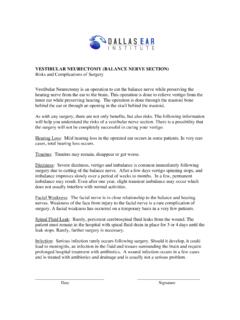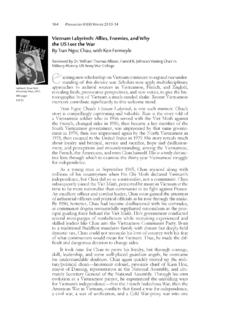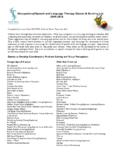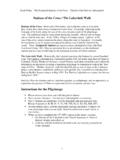Transcription of LABYRINTHECTOMY Risks and Complications - Dallas Ear
1 LABYRINTHECTOMY Risks and Complications Your condition may be helped by an operation to remove the lining of the inner ear. As with any surgery there are not only gains, but also Risks . You must keep in mind that rarely, a patient may not benefit from the surgery, and the symptoms may be worse. The Risks are listed below. Hearing: Any residual hearing that is present in the affected ear will be lost after this surgery. Dizziness: The primary goal of this surgery to improve dizziness in patients. Vertigo, or spinning dizziness, is common for the first several days after this surgery. Unsteadiness may be present for several weeks to months after the procedure. To speed the compensation provided by the other ear, it is important to stay active and perform balance-training exercises. Infection: After any surgery, infection is a potential complication. This is very rare after this surgery.
2 Facial Nerve Paralysis: The facial nerve controls movement on one side of the face and runs through the ear. Paralysis after this surgery is exceedingly rare, but may occur. Numbness of the Ear: It is common to have numbness of the ear after any type of ear surgery. This will improve over several months, and only very rarely is permanent. Spinal Fluid Leak: Spinal fluid bathes the brain and very rarely may leak out through the incision or through the nostrils after ear surgery. If this occurs, a procedure may need to be performed to stop the flow of fluid. Ringing: Ringing in the ear (tinnitus) is often present in patients undergoing this type of surgery. After surgery, ringing is usually less but can be worse and quite bothersome. Taste Disturbance: The nerve that supplies one third of the taste to the tongue runs through the middle ear. Therefore, temporary taste disturbance occurs rarely after this surgery.
3 Our goal in performing a LABYRINTHECTOMY is to help you with the balance symptoms you are experiencing. But like other aspects of life, there are no guarantees of success. If, by chance, you have had a bad result after surgery, we will do our best to treat the problem Please let me or the staff of the Dallas Ear Institute know if you have any questions. _____ _____ Signature Date














